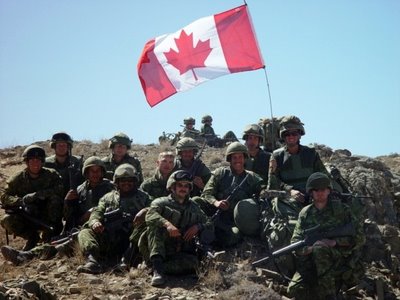
From Doug Saunders, the Globe and Mail: Ten years and seven weeks ago, this paper’s front-page headline read, in banner letters, “Canadians head off to war.” That would become the longest, and possibly the most controversial, military combat operation in Canadian history. On Thursday, with the lowering of the Maple Leaf flag at Kandahar Air Force base, it effectively came to an end: For the first time in more than a decade, Canada is not at war. . . .
It’s popular nowadays to say, for understandable reasons, that we should get out of the military-intervention business forever, and stick to blue-helmet United Nations peacekeeping, like we did before 1991. (The Persian Gulf war that year was Canada’s first full-fledged military commitment since Korea in the 1950s).
I can almost sympathize. But then I remember the horrible years of 1994 and 1995, when more than 500,000 Rwandans were hacked to death in a matter of weeks because peacekeepers weren’t allowed to stop them, and tens of thousands of Bosnian Muslims and thousands of Serbs and Croats were killed in terrible ways because the blue helmets were obligated to stand by and watch. . . .
The “humanitarian war” became the oxymoron of our age. Canada tried to codify it into international policy with the creation of the “responsibility to protect” (R2P) doctrine, an obligation to intervene to stop atrocities, which prime minister Jean Chrétien had the misfortune of attempting to sell to world leaders shortly after president George W. Bush’s “mission accomplished” speech. Its principles sounded far too much like the Iraq war’s cobbled-together self-justifications.
The R2P doctrine sprung back to life this year, because it was used to make the legal case for the Libya operation. But I doubt it could ever become a universal code: We’ll never intervene in Zimbabwe or Tibet, because we’d have no support from the surrounding countries and zero chance of success. We decided against intervening in Sudan’s Darfur catastrophe, in part because there was a good chance it would make things worse.
I fear that Libya will be seen as a precedent, rather than an exception. Or that Bosnia will be forgotten, and a “humanitarian corridor” to Syria will become another peacekeeping quagmire. But I also fear that another genocidal massacre will be allowed to pass without comment. War is hell, but it’s not the only one. (photo: Surghar Daily) (via Real Clear World)
Image: surgarnet%2010%2025%2011%20Canadian%20forces%20in%20Afghanistan.jpg
